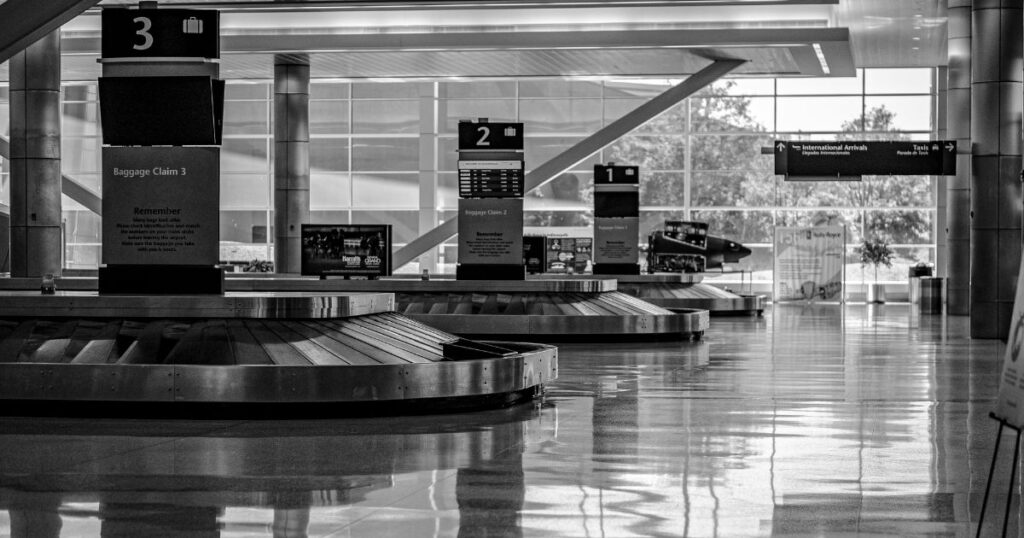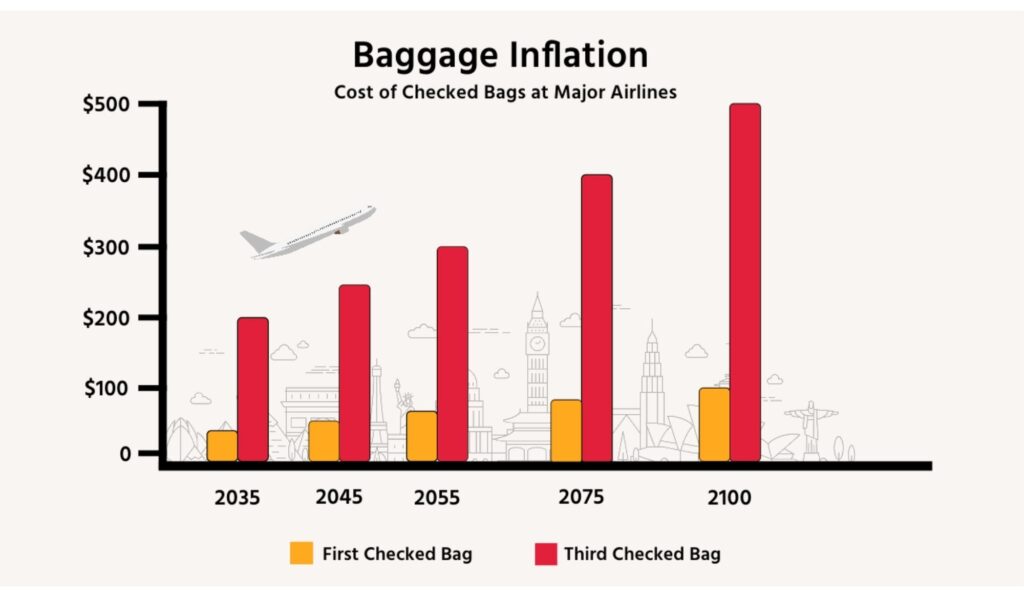Bagflation Investigation: Here’s How Much Checked Bags Will Cost in 2100

Checked baggage. Whether you love it, hate it, or are resigned to paying for it, one thing is undeniable: it’s an extra cost associated with travel that no one relishes. And if you’ve noticed that cost is steadily rising year over year, you’re not alone: thousands of travelers are seeing it, too.
It’s not just hearsay: based on data we’ve gathered, a checked bag fee could be as much as $100 in the year 2100 – a rate that, for the math whizzes out there, is almost 50% greater than the rate of inflation.

How did we get here?
In 2008, American Airlines and United Airlines made $15 checked bag fees standard across the majority of their flights. When these airlines realized that travelers were willing to pay for checked luggage, more airlines followed suit.
Today, after 15 years, the majority of domestic airlines now charge $25 for the first checked bag. This includes:
- American Airlines
- Frontier
- United Airlines
- Spirit
- JetBlue
- Alaska Air
Here’s where the math comes in: if, in the 15 years since the introduction of the checked bag fee, the price has gone up $10 and the inflation rate of $15 in the United States brings it to $21.72, then we can easily see that the “baggage inflation rate,” as we call it, is 149% of the U.S. dollar inflation rate.
Using those numbers, it’s not hard to see the way the dam breaks.
- In 2035, a checked bag will cost $35
- In 2045, a checked bag will cost $45
- In 2055, a checked bag will cost $55
As a result, if the bag fee increases remain constant, then a first checked bag of normal size will be about $100 in 2100.
And it doesn’t end there…
Baggage fees creep higher when you need to check more than one bag, with some airlines already charging as much as $200 for a third checked bag. Using the same baggage inflation rate and projecting it into the future, we see that by 2100, a third checked back could cost as much as $400 to $600 or more, depending on the airline.
On top of this, oversized and overweight bags carry additional charges with virtually every airline, sometimes as much as $200 for major airlines like American Airlines and United. With these fees already sky-high, we can expect those fees to continue to climb in the coming decades.
Fast forward to 2100, you might see fees as high as these for special types of luggage:
- Oversized bags: $400 – $1,545
- Overweight bags: $515 – $1,050
That’s a whole lot of money for a heavy or odd-shaped bag!
Why does this matter?
Remember when we said that a checked bag fee was an extra cost associated with travel? That’s true for travelers, but for airlines, it’s an extra way to make money. While these baggage fees have grown exponentially, domestic ticket prices largely haven’t – indicating that airlines are leaning into those as a way to bring in more cash.
Outside of seasonal shifts and high-traffic spikes, domestic ticket prices have remained largely the same. In fact, the COVID-19 pandemic tanked ticket prices (though they bounced right back near the end of 2021). There’s usually a 10% up or down, more or less, which, even adjusted for inflation, is far less drastic than the uptick in baggage fees.
As an example, the average ticket price for a flight out of LAX is in the low $300s – and it’s been that price for decades. Adjusting for inflation, a $315 ticket from 2004 is about $500 in today’s money, but year to year, that price has remained steady.
But that doesn’t mean airlines are content to toe that bottom line. Baggage fees are on their own inflation trajectory – one that outpaces the inflation of the U.S. dollar by almost half. According to the U.S. Bureau of Transportation Statistics, baggage fees totaled a record of $5.76 billion in 2019 – 12 times more than the baggage fees collected in 2008. This is a sobering look at what’s to come…especially for those accustomed to booking cheap flights, checked baggage notwithstanding.